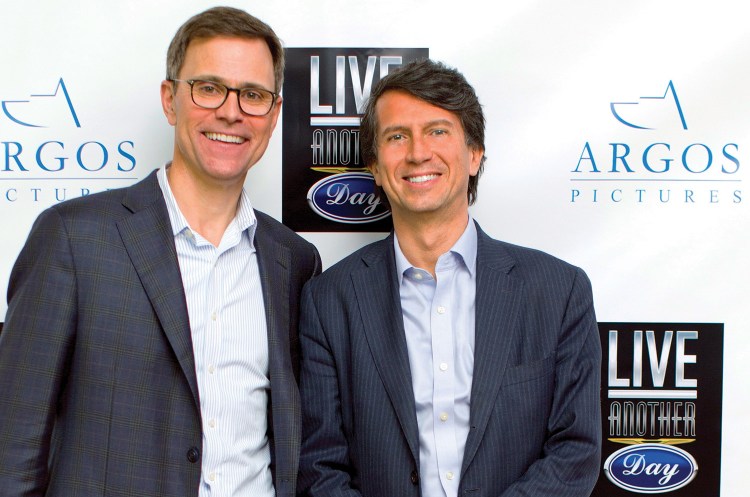Bill Burke says that people who want a definitive summation of how the government bailout of the auto industry was handled – good, fair, bad? – will not find it in his new documentary film “Live Another Day.”
The effort to save the big car companies, and millions of jobs, was far too complex to be summed up simply, he says. Burke, who is chairman of the Portland Sea Dogs and a former Turner Broadcasting executive, interviewed some 30 auto executives, government officials and labor leaders for the 104-minute film, which opens nationally Friday.
And while he won’t give the bailout a grade, he has come to the conclusion the crisis that caused it could happen again. The bailout cost taxpayers about $10 billion to $15 billion.
“The government absolutely had to do something, with millions of jobs at stake, but the underlying problems have not been fixed,” said Burke, 50, who lives in Cape Elizabeth. “The (labor) contracts, right or wrong, limit what the companies can do when sales go from 17 million to 8 million overnight. (Car companies) make no money on small cars. If something happens to gas prices again, or to the economy, the industry could be in big trouble.”
Burke co-produced and co-directed the film with Didier Pietri, a former executive at Walt Disney Company and ABC. The two met at Harvard Business School more than 20 years ago. Burke said he and Pietri had wanted to work together on a project and thought their backgrounds were suited to documentaries. Pietri had read “Crash Course,” a book on the bailout by former Wall Street Journal executive Paul Ingrassia, and he was intrigued by the possibility of basing a film on it. Growing up in France, Pietri had been fascinated with American cars. Burke was born in the Detroit area and spent his early years there, where his father was managing a radio station.
Burke, the son of the late Sea Dogs’ founder Dan Burke, began his career in TV in the early 1990s. He was the first general manager of Turner Classic Movies, president of the Weather Channel Companies, and chief executive of news and information for Time Warner Digital Media. He moved his family to Maine around 2004 and was chief executive of Resort Sports Network in Portland. He also co-wrote Ted Turner’s best-selling autobiography “Call Me Ted.”
Though he had overseen documentaries for cable channels, for “Live Another Day” Burke played a much more direct role, writing questions and interviewing people on camera.
The film focuses on the crisis the industry found itself in at the end of 2008, part of the larger financial crisis, as well as the bailout and government action that followed.
Because the bailout is so complex, with many parts of it generating intense criticism, the film is filled with people who disagree with each other.
Greg Gardner, a Detroit Free Press writer who has covered the auto industry for 25 years and was interviewed for the film, said no one who watches it will think it leans too much to one side or the other. Instead, it’s balanced, he said, and explores the major points, and problems, of the bailout.

Cape Elizabeth resident Bill Burke interviews car buff and comedian Jay Leno for the new documentary film “Live Another Day” about the auto industry bailout. Photo courtesy Bill Burke
“I don’t think anyone, Democrat or Republican, will agree with all of it. I think everyone will find something to take issue with,” said Gardner. “It gives you a good idea of the larger picture, of the crucible of crisis we were living through at the time. That’s a strong point of the film.”
Burke said that, of the interviews he did for the film, one that stands out was with Sergio Marchionne, chairman of Fiat Chrysler Automobiles, because Marchionne had rarely given interviews. Fiat aligned with Chrysler during Chrysler’s bankruptcy, and later the two companies merged.
Burke said he was able to contact some interview subjects with the help of friends or business associates. But he soon found that a lot of people involved in the historic event wanted to talk about it.
“A lot of times it was just a question of asking someone. And then people started giving us other people’s numbers,” said Burke.
Burke and Pietri chose to not use a narrator for the film, so the people being interviewed are the only voices.
Among them are Jay Leno, comedian and well-known car buff; John Casesa, vice president of global strategy at Ford; Ron Bloom, assistant to President Obama for manufacturing policy; Bob King, former president of the United Auto Workers; Steve Rattner, who served as lead adviser to the Presidential Task Force on the Auto Industry; and Bob Lutz, former chairman of General Motors North America.
“These are very smart people who choose to disagree with each other, and that’s a refreshing thing to see” in a film, Burke said.
Send questions/comments to the editors.




Comments are no longer available on this story